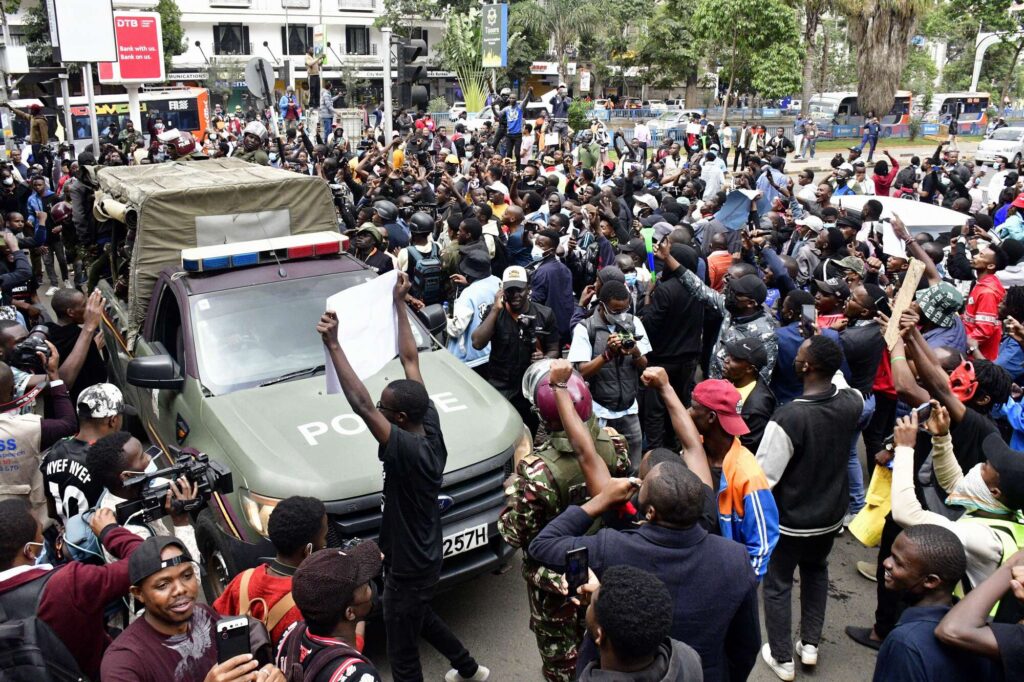In the vibrant era of modern activism, social media serves as a transformative force, empowering individuals and communities to amplify their voices and mobilize for causes that resonate deeply.
In the recent weeks of June, nowhere has this power been more palpable than in Kenya, where the Finance Bill 2024 which had sparked a groundswell of youth activism and digital organization. Across Twitter timelines, Instagram, Tiktok and WhatsApp groups, young Kenyans are not merely spectators but active participants in shaping the discourse around economic policy and governance. Through hashtags such as #RejecttheFinanceBill2024 and #OccupyParliament, memes, and impassioned posts, they are not only dissecting the implications of the bill but also encouraging their peers to take to the streets in peaceful protests.
The Finance Bill was tabled in Parliament for debate by the National Assembly Finance Committee Chair Kuria Kimani on June 18. The Bill proposes tax hikes on various goods and services as a means to increase the government revenue. Some of the provisions in the Bill include imposing 16% VAT on bread, hikes on money mobile transfer and an annual 2.5% tax on cars. Moreover, the bill proposes an eco-tax on products that are considered harmful to the environment including packaging, plastics and tyres and would increase the cost of staples such as nappies, sanitary pads, computers and mobile phones.Other taxes include 16% VAT on some financial services and foreign exchange transactions. Even income from digital content creation and marketplaces will be taxed under the Bill.
Kenyans are already overburdened with the high cost of living and have been faced with several tax hikes on salaries and fuel since the new government stepped into office in 2022. The 1.5% housing levy which was introduced to build affordable homes for the poor on monthly income and higher insurance tax is due to come into effect in July.

The Finance Bill 2024 is the final straw for several Kenyans. Across twitter timelines, the hashtag #RejecttheFinanceBill2024 has been trending across the country. Twitter spaces are been used to hold discussions about the bill and the current political situation. An online petition on Charge.Org about rejecting the finance bill has accumulated more than 28,000 votes since the date of its launch on June 15th.
Tuesday June 18th marked the first day of peaceful protests against the bill on the streets of Nairobi.More than 200 protesters were arrested and the police hurled tear gas canisters at demonstrators. On Wednesday, protests took place in the coastal city of Mombasa.The outrage that ensued pushed the government to propose dropping some of its planned taxes such as the 16% VAT on bread and the motor vehicle tax. However, the proposals to drop some tax have had a minimal effect on lowering the discontent amongst the protesters.
On Thursday 19th, many Gen Z and millennials took to the streets across the country from the major city of Nairobi to the regional hubs of Kisumu and Eldoret to push their agenda on the rejection of The Finance Bill. Celebrities who were criticised for their silence on the matter joined the vibrant crowds. Musicians such as Nvirii the Storyteller and Nyashinki joined the movement.Lawyers have offered legal support to detained protesters and doctors set up medical camps in Jamia Mosque to provide medical care to those injured during the protests.Unfortunately,two people Rex Kanyike Masai and Evans Kiratu succumbed to shotgun wounds from the protests and there have been abductions of youth activists and supporters such as Dr. Fred Onyango aka JaPrado who set up a blood donation drive, Billy Simani aka the Crazy Nairobian and Shadrack Kiprono.
Following the confirmation of the abduction of the notable figures, many Kenyans took to the X to raise more awareness on the matter by using hashtags such as #FreeJaPrado, #Free Billy and #Free Shad. Dr. Fred Onyango, Billy and Shadrack have been released after their alleged arrests .
As the demonstrators dealt with choking tear gas and pink-dye water canons, 204 Members of Parliament out of 309 voted to pass the Bill making the bill sail through the second reading. This did not dim the spirit of the youth instead it further fueled their outrage which resulted in the 7 days of rage Plan.
From Friday 21st June to Thursday 27th June, each day had a main action point.The action points were as follows: Day 1, Friday 21st June: After City Mortuary, attend Juma prayers at Jamia Mosque, and give water to those leaving after the prayers. Day 2, Saturday 22nd June: At midnight, all bars and clubs where Gen Z frequents stopped the music to listen to a national crescendo of Ruto must go and Reject Finance Bill. Day 3, Sunday 23rd June: Deplatform politicians in church. Any politicians who voted YES was not allowed to speak in your church. Day 4, Monday 24th June, courtesy calls were made on the Members of Parliament who voted Yes. Day 5, Tuesday 25th June, #Occupy Parliament and Total Shutdown Kenya, a national strike ensued. Schools and businesses were closed.Day 6, Wednesday 26th June, visit IPOA(Independent Policing Oversight Authority and the Inspector General of Police demanding Justice for Rex. On the final day, Thursday 27th June, all main roads leading to Nairobi were blocked as protests continued.
Kenyans in the diaspora showed their solidarity with those at home as they too held protests in different cities in the United States and United Kingdom. On Monday 24th June, Kenyans residing in Washington D.C held their protests before the Kenyan Embassy whereas those in the United Kingdom held protests before the Kenya High Commission on Tuesday 25th June.

On Tuesday 25th June,there was a higher turn up during the protesters from Nairobi to other regional areas like Kericho,Eldoret,Nyeri.Police opened fire on those demonstrators who tried to storm into the Parliament, with at least ten protesters shot dead whereas over 120 protesters with shot wounds were rushed to Kenyatta National Hospital. It is heartbreaking that those rejecting the finance bill ended up losing their lives. Rejecting the bill should not be a death sentence.196 members of Parliament approved the bill whereas 105 rejected the bill, thus making the bill proceed to the third reading. The next stage is the presidential assent where the President signs the bill therefore making it law. Moments after the bill sailed through the Parliament, protesters stormed into Parliament.
On Wednesday 26th June, President Ruto bowed to the pressure from Gen Z and held a press conference where he stated that he has heard the voices of the people therefore he will not sign the bill.
This intersection of technology and activism proves a profound shift in how societal issues are tackled and advocacy is conducted, demonstrating the pivotal role of social media in modern movements for change.

